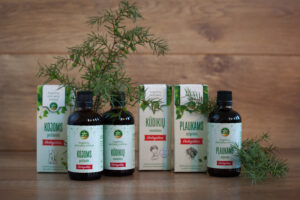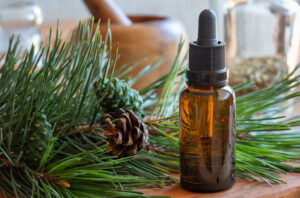Eucalyptus (Eucalyptus globulus)
A plant of the myrtle family (Myrtaceae)
Synonyms: Eucalyptus Citriodora, Eucalyptus Camaldulensis, Eucalyptus Dives, Eucalyptus Polybractea, Eucalyptus Radiata.
Kilmė
Eucalyptus, the “blue tree”, is native to Australia. Its leaves have been used as a medicinal plant by Aboriginal people since ancient times. In the 19th century, the German botanist F. von Mueller introduced the tree and its essential oil to the world. Nowadays, eucalyptus is not only found in Australia, but also in North Africa, Spain, California and India.
Method of receipt
Extracted from leaves and young twigs by steam distillation. Up to 45-50 kg of fresh eucalyptus leaves and twigs are needed to produce 1 kg of essential oil.
Properties of the oil
Colourless liquid. It has a penetrating, camphor-like odour with a sweet, woody aftertaste. This fragrance is alert and refreshing.
The top note of the aroma. The aroma lasts up to 24 hours.
Main ingredients
| 1,8-cineole | 65,4-83,9 % |
| α-pinene | 3,7-14,7 % |
| (+)-Limonene | 1,8-9,0 % |
| Globulol | tr-5.3% |
| (E)-Pinocarveol | 2,3-4,4 % |
| p-digit | 1,2-3,5 % |
| (+)-Aromadendrine | 0,1-2,2 % |
| Pinocarvon | tr-1.0% |
Impact
Analgesic, anti-neuralgic, anti-rheumatic, antiseptic, antispasmodic, antiviral, soothing, anti-scarring, deodorising, anti-odorising, air purifying, diuretic, expectorant, fever-reducing, parasite-killing, prophylactic, anti-flushing, stimulant, anthelmintic, anti-inflammatory, and wound-healing.
Therapeutic properties
Eucalyptus oil is warming, soothing and has excellent anti-inflammatory properties. Suitable for massage and bath oil combinations, it is particularly effective for steam inhalation. It is particularly good with cedarwood, cypress, lavender, marjoram, pine, tea tree and thyme essential oils. Eucalyptus stimulates the nervous system, helping to relieve fatigue, lack of concentration, headaches and weakness. The oil is used for inhalation or sprayed indoors.
Australian Aborigines used eucalyptus leaves to suppress fever caused by various diseases, including malaria. The essential oil is very helpful for respiratory infections, colds, flu, sinusitis, bronchitis and pneumonia. Its warming effect is particularly pleasant when you feel cold. It also relieves puffiness, makes breathing much easier and helps with expectoration, especially if there is a lot of thick white mucus. This oil can be combined with aniseed oil to treat coughs and with cypress oil to treat runny noses. It also helps with asthma.
Eucalyptus essential oil is an important remedy for rheumatism and arthritis, especially when parts of the body become stiff and immobile, or when symptoms are aggravated by cold and damp weather. Try combining it with lavender or pine oil for compresses or massages.
The antibiotic properties of eucalyptus help with urinary tract infections, especially if purulent discharge occurs. Try this oil if you have a cystitis with a cold. The oil also helps with genital infections such as thrush: it should be diluted properly and used for sitz baths.
Due to its antibiotic properties, this oil is also used to treat skin infections, wounds, blisters and ulcers. If an insect bites, it is possible to relieve the pain by applying the oil directly to the skin. Eucalyptus oil also kills parasites: a mixture of eucalyptus oil and other oils can kill lice. It has an antifungal effect, making it suitable for treating foot fungus or other affected areas.
Eucalyptus oil is an excellent antiseptic spray, which should be used in the sick person’s room. It is also an effective repellent, especially when mixed with cypress and lemon essential oils.
Applications in aromatherapy
For burns, sores, chicken pox, measles, measles, lip blisters, cuts, insect stings and bites, insect repellent, head lice control, skin infections, wounds, arthritis, muscle pains, sprains, circulatory disorders, cystitis, hay fever, colds, flu, headaches, neuralgia.
Psychological effects
Eucalyptus is useful when you realise it’s time to make a change in your life but feel stuck, when you can’t find peace but can’t move forward because of the fear of change and uncertainty of direction. In this state, everything starts to crash. That’s when you need eucalyptus – to bring back clarity of thought and to help you on your way through life, overcoming fear and confusion.
Goes well with
Cedarwood, cypress, lavender, lemon, marjoram, pine, rosemary, tea tree, thyme essential oils.
Safety tip
We agree with the maximum dose recommended by the Federal Institute for Medicinal Products and Medical Devices: 600 mg; up to 20% when applied to the skin.
Warning
Eucalyptus oil is generally considered to be non-irritating and non-sensitising. However, allergy sufferers are advised to first test its effects on a small area of skin.
Other species
Eucalyptus Camaldulensis, Eucalyptus Dives, Eucalyptus Polybractea, Eucalyptus Radiata.
References
- C. Wildwood “The Encyclopedia of Aromatherapy”, Vermont, Healing Arts Press, 1996
2. R. Tisserand, R. Young, E. M Williamson “Essential Oil Safety. A Guide for Health Care Professionals”, Churchill Livingstone ELSEVIER, 2014
3. S. Curtis “Essential Oils”, AURUM, London, 1996
4. R. Balz “The Healing Power of Essential Oils”, LOTUS LIGHT SHANGRI-LA, Twin Lakes, 1996
5. Л.ГДудченко, Г.П.Потебня, Н.А.Кривенко «Ароматерапия и аромамасаж», «Максимум», Киев, 1999




